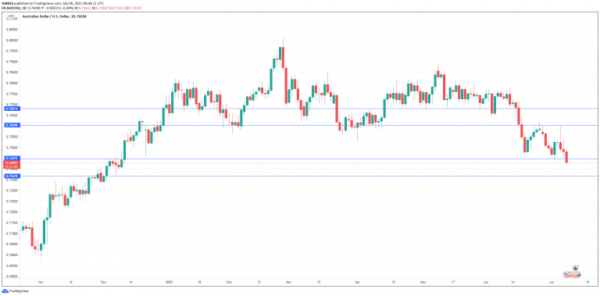The Australian dollar has fallen for a third straight day. In the European session, AUD/USD is trading at 0.7428, down 072% on the day.
It’s turning into an ugly week for the Australian dollar, as AUD/USD has fallen by 1.30%. The pair is currently at its lowest level since December 2020.
The Aussie has been hit by a double-edged punch. First, US Jolts Job Openings climbed to a record high of 9.21 million in May, up from a revised 9.19 million in April. This is another signal that the demand for workers continues to outstrip supply. If this situation persists, this will likely lead to upward pressure on wages, and consequently, higher inflation. Investors are concerned that the Fed could tighten policy in order to curb inflation, and tighter policy, especially a rate hike makes the US dollar more attractive.
Dovish Lowe weighs on Aussie
Secondly, RBA Governor Philip Lowe said today that it was likely that QE would be needed in future business cycles. Lowe continues to send out a dovish message to the markets, even though the RBA tightened policy this week and tapered its asset purchase program from AUD 5 billion per week to AUD 4 billion per week. At the policy meeting, Lowe reiterated that he did not expect the bank would raise interest rates before 2024. The Australian dollar initially showed gains after the taper move, but the dovish stance of the RBA brought out the bears and sent the Aussie lower on Wednesday.
The FOMC minutes indicated that policymakers discussed tapering at the last policy meeting, but most members agreed that there was no need at this time for any shifts in policy, as the economy still needed to make “substantial further progress”. The minutes did not shed any light on the critical question of when the Fed might begin to taper, and market reaction was muted.
AUD/USD Technical
- AUD/USD is testing support at 0.7447. Below, we find support at 0.7367
- On the upside, there is resistance at 0.7604 and 0.7681

